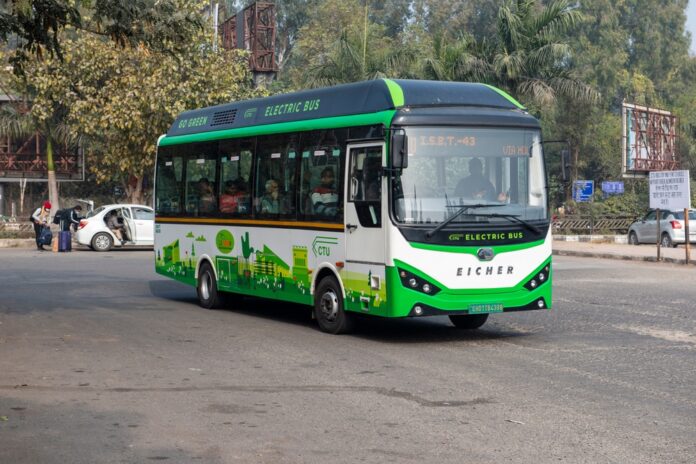In the dynamic landscape of urban transportation, electric buses have emerged as a pivotal element in addressing critical environmental and public health concerns.
The transition from traditional diesel buses to electric alternatives represents a significant step towards reducing carbon emissions and fostering a more sustainable urban ecosystem. However, the implications of this shift extend far beyond mere environmental considerations.
This article explores the benefits of electric buses for public health and urban well-being, from improved air quality to noise reduction.
Electric buses have huge potential to shape the future of urban mobility and they are essential for fostering healthier and more liveable cities.
The benefits of electric buses: From air quality to low-emission transport
With the pressing need to address urban air quality issues and support low-emission public transport, the shift towards electric buses has become a critical component in improving environmental and public health outcomes.
The benefits of electric buses include reducing air pollution, cutting urban emissions, and promoting low-emission transportation options. These buses are equipped with soot-free technologies that help combat harmful particulate matter and greenhouse gas emissions, thus contributing to cleaner and healthier urban environments.
By transitioning to electric buses, cities can effectively tackle the challenges related to air quality and public health, impacting millions of individuals who rely on public transport daily.
Moreover, the adoption of electric buses aligns with global efforts to combat climate change and promote sustainable transportation solutions. These vehicles not only reduce noise pollution levels in urban areas but also offer a more environmentally friendly alternative to traditional diesel buses.
The emphasis on low-emission public transport reflects a shift towards more sustainable and efficient modes of transportation that benefit both the environment and public health.
As cities continue to prioritise cleaner air and reduced emissions, the benefits of electric buses in achieving these goals can’t be understated.
The role of electric buses in the transition to net zero
The benefits of electric buses in improving environmental and public health outcomes underscore their significant advantage in reducing greenhouse gas emissions compared to diesel buses.
Electric buses emit 181 fewer metric tonnes of CO2 per bus than their diesel counterparts, showcasing their substantial contribution to mitigating climate change. This reduction plays a pivotal role in enhancing air quality by decreasing harmful pollutants that lead to respiratory issues and other health concerns.
Moreover, transitioning to electric buses is projected to prevent 3,700 premature deaths by 2030, emphasising the direct link between sustainable transportation choices and positive health outcomes.
In addition to the environmental and health benefits, electric buses also demonstrate cost savings and energy efficiency advantages. Studies have indicated that electric buses exhibit lower energy consumption on an annual basis when compared to traditional diesel buses, further highlighting their sustainability benefits.
By embracing electric buses, cities, and transportation agencies can progress towards a fossil fuel-free society while simultaneously reducing their carbon footprint and environmental impact.
Noise reduction capabilities
Electric buses enhance urban environments through reduced noise pollution. They offer significant benefits in creating quieter and more peaceful surroundings for residents. Operating electric buses results in considerably lower noise levels compared to traditional diesel buses, contributing to urban tranquillity and improving the overall quality of life for urban residents.
Noise measurements conducted on electric buses demonstrate their ability to reduce environmental noise pollution and enhance the urban acoustic environment, positively impacting community well-being.
The transition to electric buses presents an opportunity to create quieter and more sustainable public transportation systems, aligning with the goal of sustainable transport in urban areas. The reduced noise levels from electric buses not only benefit the immediate vicinity but also have a ripple effect on the broader community, promoting a sense of well-being and comfort among residents.
The noise reduction benefits of electric buses underscore their potential to significantly enhance the urban environment, making them a valuable asset in promoting healthier and more liveable cities.
Examination of the environmental impact throughout the lifecycle of electric buses
Electric buses not only contribute to a quieter urban environment but also demonstrate lower environmental impacts throughout their lifecycle compared to traditional diesel buses. When considering the environmental impact of electric buses, factors such as energy efficiency, emissions reduction, life cycle assessment, sustainability benefits, and economic advantages come into play.
Electric buses are more energy-efficient than their diesel counterparts, consuming less energy annually. This increased energy efficiency contributes to lower overall greenhouse gas emissions and reduced reliance on fossil fuels.
From a sustainability perspective, the benefits of electric buses include reducing air pollution and mitigating the effects of global warming.
Additionally, their economic advantages are notable, with lower lifecycle costs, simplified maintenance requirements, and long-term cost savings over the lifespan of the vehicle.
Case studies of cities that have adopted electrification
Incorporating electric buses into urban transportation systems has resulted in notable environmental and health benefits for various cities worldwide. Cities like Shenzhen have reported a decrease in air pollution and associated health issues following the adoption of electric buses.
London has seen improvements in air quality and public health since integrating electric buses into their transport system. Similarly, Santiago has experienced substantial environmental and health advantages with the widespread use of electric buses, leading to reduced pollution and enhanced public well-being.
Oslo has also reaped significant benefits of electric buses, resulting in cleaner air and improved public health outcomes. Additionally, Los Angeles has observed positive impacts on the environment and public health through the adoption of electric buses, resulting in reduced emissions and improved air quality.
These examples highlight the positive effects of transitioning to electric buses, showcasing improvements in air quality, reduced pollution, and enhanced public well-being.


